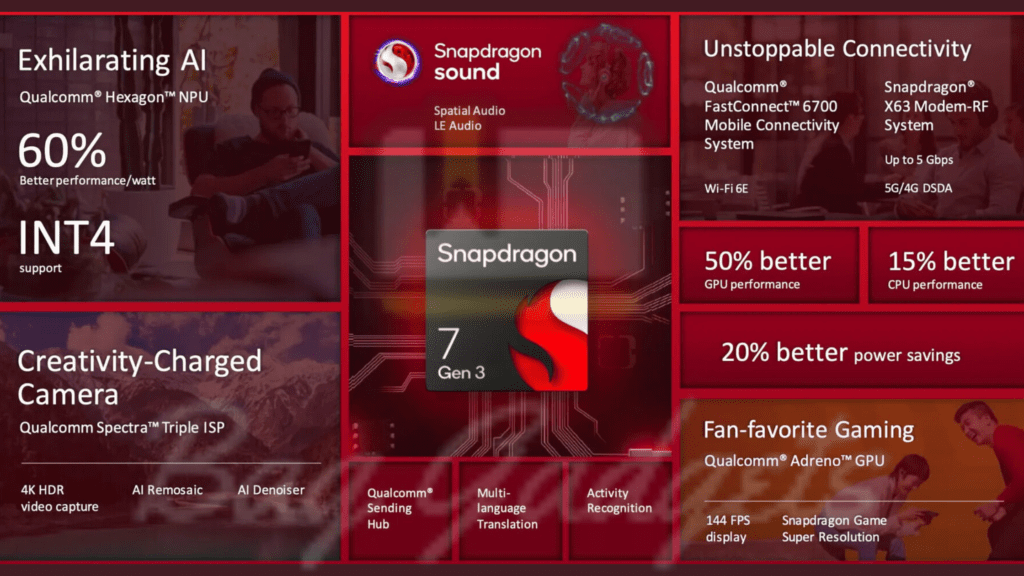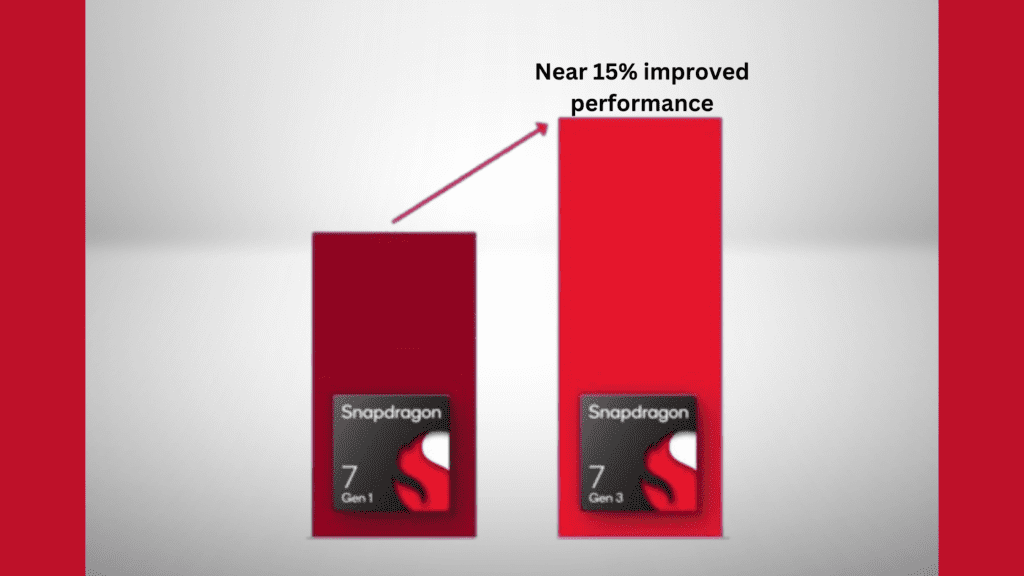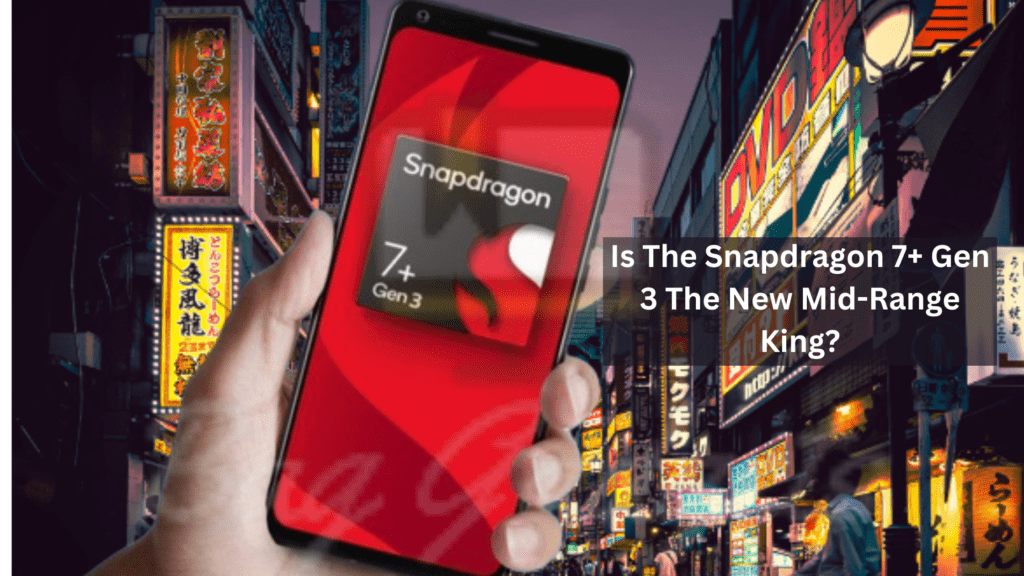The mid-range smartphone market is a battleground of innovation. Here, manufacturers strive to strike a balance between affordability and performance. Qualcomm’s latest offering, the Snapdragon 7+ Gen 3, has entered the ring, sparking a crucial question: is it the new mid-range champion? We delve into the technical prowess of the 7+ Gen 3, explore real-world performance, and compare it to rivals to deliver a definitive answer.
Unleashing Performance: A Deep Dive into the 7+ Gen 3
The 7+ Gen 3 boasts a cutting-edge 4nm manufacturing process, translating to significant performance gains over its predecessors. This translates to a more efficient chip that generates less heat while delivering exceptional processing power.
At its core lies an octa-core Kryo CPU configuration:
- A single, high-performance Cortex-A715 core clocked at 2.8 GHz
- Three Cortex-A715 cores operating at 2.4 GHz
- Four power-efficient Cortex-A510 cores running at 1.8 GHz
This combination ensures smooth multitasking, flawless app execution, and the ability to handle demanding applications with ease.
A Gaming Powerhouse: The Adreno 730 GPU Takes Center Stage
The 7+ Gen 3 incorporates the Adreno 730 graphics processing unit (GPU). This upgraded GPU boasts a significant leap in graphical performance compared to the Adreno 720 found in the Snapdragon 7 Gen 3. Users can expect over 50% faster graphics rendering, making the 7+ Gen 3 ideal for mobile gamers seeking a superior visual experience.
Furthermore, the 7+ Gen 3 introduces two groundbreaking features specifically designed to enhance the gaming experience:
- Game Post Processing Accelerator: This innovative technology optimizes the efficiency of visual effects like bloom, depth of field, and motion blur, enhancing graphical fidelity without compromising performance.
- Adreno Frame Motion Engine 2.0: This revolutionary technology effectively doubles frame rates from 60 FPS to 120 FPS in games without impacting battery life. This translates to smoother gameplay and a noticeably more responsive experience.


Unparalleled Connectivity for a Seamless User Experience
The Snapdragon 7+ Gen 3 integrates the Qualcomm X63 5G Modem-RF System, enabling blazing-fast connectivity speeds. This modem supports Dual-SIM Dual-Active (DSDA) 5G and 4G, providing users with maximum flexibility when choosing a network. Additionally, the Qualcomm FastConnect 6700 Mobile Connectivity System empowers users with Wi-Fi 6/6E capabilities and Bluetooth 5.3 for seamless wireless connections.
Benchmarking the Beast: How Does the 7+ Gen 3 Stack Up?
Real-world benchmarks paint a clear picture of the 7+ Gen 3’s performance prowess. Here’s a breakdown:
- CPU Performance: Compared to its predecessor, the 7+ Gen 3 demonstrates a substantial improvement in CPU performance, exceeding benchmarks by up to 15%.
- GPU Performance: The Adreno 730 GPU delivers a remarkable leap in graphics rendering, outperforming the Adreno 720 by over 50%.
The Contenders: Snapdragon 7+ Gen 3 vs. The Competition
The mid-range segment boasts several capable processors. To determine if the 7+ Gen 3 reigns supreme, let’s compare it to key rivals:
- Snapdragon 7 Gen 3: The 7+ Gen 3’s immediate predecessor offers a solid foundation. However, the 7+ Gen 3 boasts a significant advantage in both CPU and GPU performance, making it a more compelling choice for demanding users.
- MediaTek Dimensity 8100: This competitor from MediaTek presents a close challenge. Benchmarks indicate comparable CPU performance, while the Dimensity 8100 utilizes a different GPU architecture. Gamers might find the Adreno 730’s focus on visual effects and frame rate improvements in the 7+ Gen 3 slightly more appealing.
Here’s a quick comparison table to summarize the key points:
| Feature | Snapdragon 7+ Gen 3 | Snapdragon 7 Gen 3 | Dimensity 8100 |
|---|---|---|---|
| CPU Architecture | Kryo | Kryo | A78 + A55 |
| CPU Cores | 1x 2.8GHz + 3x 2.4GHz + 4x 1.8GHz | 1x 2.3GHz + 3x 2.2GHz + 4x 1.8GHz | 4x 2.75GHz + 4x 2.0GHz |
| GPU | Adreno 730 | Adreno 720 | Mali-G610 MC6 |
| Benchmark (CPU) | Higher | Lower | Similar |
| Benchmark (GPU) | Significantly Higher | Lower | Slightly Lower |
| Price | Potentially Higher | Lower | Similar |


Beyond Benchmarks: Real-World Considerations
While benchmarks offer valuable insights, real-world usage paints a more holistic picture. Here are some additional factors to consider:
- Software Optimization: Both the hardware and software of a device work together. How well a manufacturer optimizes the 7+ Gen 3 for specific tasks can impact user experience.
- Specific Needs: Gamers might prioritize the 7+ Gen 3’s graphical prowess, while power users focused on multitasking might find both processors equally capable.
The Verdict: The Snapdragon 7+ Gen 3 is a Mid-Range Powerhouse with Potential
The Snapdragon 7+ Gen 3 emerges as a compelling contender for the “New Mid-Range King” title. Its exceptional performance, focus on gaming enhancements, and future-proof connectivity features make it a highly desirable option for users seeking a powerful and versatile mid-range processor.
While the Dimensity 8100 presents a close competitor, the 7+ Gen 3’s edge in GPU performance and potential software optimization might sway users who prioritize a superior visual experience. Ultimately, the final choice depends on individual needs and budget constraints.
For users seeking the most potent mid-range processor with a focus on gaming and future-proof features, the Snapdragon 7+ Gen 3 presents a compelling proposition. However, those on a tighter budget or with less demanding needs might find value in the Snapdragon 7 Gen 3 or the Dimensity 8100, depending on specific device offerings and pricing.



